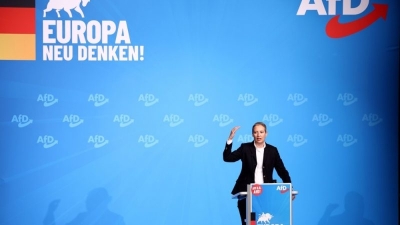Six ways the invasion of Ukraine changed the EU
The invasion of Ukraine transformed the European Union, hardening its outlook on defence and overturning an energy system built up over decades. From discussions with politicians, officials, diplomats and observers, here are some of the ways in which the war changed Europe. The normalisation of video calls during the pandemic meant there was nothing strange in inviting Ukrainian president Volodymyr Zelenskiy to join the 27 leaders of the EU nations remotely when they gathered for an emergency meeting the day of the invasion. It had a powerful effect: he told them they might not see him alive again, but that he was not leaving his post. From then on Ukrainian ministers were invited to dial in from Kyiv whenever their EU counterparts gathered, whether for meetings of agriculture ministers, trade ministers, or ministers of justice. It kept Ukraine’s priorities foremost in every policy brief throughout the first year of the war and made the conflict immediate to EU leaders, as they developed relationships with people calling in from bomb shelters as missiles landed nearby. Ukraine got to know the EU, charging through the reforms needed to progress its membership hopes even as the conflict raged. And the EU got to know Ukraine, not least through the four million refugees who registered for temporary protection within its borders. [ Ukraine War: Where the conflict stands and what the future might hold ] The Ukrainian government wants them back. And it hopes they will bring with them the experience that can build a modernised Ukraine. “I think that it’s good that you give them opportunity to learn, to study languages, to get the new skills,” Ukrainian first deputy prime minister and economy minister Yulia Svyrydenko said. “We will need it for Ukrainian reconstruction.” The dramatic break with reliance on Russian hydrocarbons has transformed the EU’s energy system and turbocharged efforts to develop renewable energy – now not only environmentally worthy, but with a hard-headed strategic and economic rationale that appeals to left and right. The end of EU’s reliance on Russian gas is the central part of a profound economic split, with lasting international consequences. “I’ve been round this block a few times as the Americans say,” says the EU’s international sanctions envoy David O’Sullivan, who is the former ambassador to Washington. “I’ve never seen the degree of genuine dialogue and consultation as there now exists particularly between the US and the EU institutions.” The demonstration of common interests in the bigger picture also did much to reset post-Brexit relations between the EU and its former member Britain. The EU has taken steps it never took before, such as using a joint pool of EU funds to reimburse member states that buy weapons for Ukraine. But the invasion starkly revealed how little EU defence co-operation had developed in two decades and the run-down state of national armies. It dashed the idea long-promoted by France that the EU should be a hard power actor that is independent of the United States. [ Zelenskiy urges West to speed up arms deliveries to Ukraine ] Instead, EU leaders openly embraced Nato and the transatlantic alliance as the backbone of European defence. Sweden and Finland applied to join Nato, and Denmark chose by referendum to end its opt-out of EU co-operation on defence. “For a number of member states it’s a cultural revolution,” said the chair of the European Parliament’s Security and Defence subcommittee, MEP Nathalie Loiseau. The hopes of Ukrainians for a prosperous and democratic future within the EU, as an alternative to Russian occupation, shamed western Europe into reopening towards the idea of admitting new countries to the union. In June candidate status was granted to Ukraine and Moldova, which also fears menacing interference by Moscow. The battle for influence in the region underlined the importance of not disappointing countries that have been in the membership queue for longer. “There is an opening with regard to the enlargement possibility,” Ukraine’s ambassador to the EU Vsevolod Chentsov said. “Ukraine is breaking this ice and I think other candidate countries will benefit from this momentum.” The practice of joint procurement, developed for vaccines during the pandemic, is now being developed as a way to avoid EU countries bidding against each other for gas contracts, and potentially for ammunition. The lessons of the scramble for medical supplies and vaccine components, which illustrated to the EU the risks of having supply chains for essential products that are outside their control, have now been reinforced. “If I mention Russian oil and gas, these dependencies were seen as a way to have cheap energy for tremendous growth,” Ms Loiseau said. “Now we realise that it was a weakness.” Determination to avoid vulnerable dependencies is now playing out in other areas, from critical raw materials to microchips. The EU is simultaneously developing an industrial policy to incentivise home-grown strategic industries. For pro-free trade countries such as Ireland, the debate has strayed a little too close to protectionism and state-led dirigisme than is entirely comfortable.Kyiv calling
Ukraine one year on: ‘Why should I leave my home, my world, my country?’
Six ways the invasion of Ukraine changed the EU
:quality(70)/cloudfront-eu-central-1.images.arcpublishing.com/irishtimes/2DR7N5J6EGVJHGHWND3R4Y55Z4.jpg)
War in Europe, One Year On: Irish man upholds EU’s economic weapon against Russia
:quality(70):focal(1281x525:1291x535)/cloudfront-eu-central-1.images.arcpublishing.com/irishtimes/YKGZZ6LRH5BNJMC7RGWZSEAB3I.jpg)
‘I turned around and saw a bullet had hit her. And a red patch appeared straight away on her sweater’
:quality(70)/cloudfront-eu-central-1.images.arcpublishing.com/irishtimes/ZEEUYWSS45GKZEEKCDJFPN6QQY.jpeg)
:quality(70)/cloudfront-eu-central-1.images.arcpublishing.com/irishtimes/W5QTKWMDN7RI5IQDCWKT5PGRH4.jpg)
Energy system shake-up
Strengthened western alliance
Upheaval in defence
Enlargement is back
Dislike of dependency



